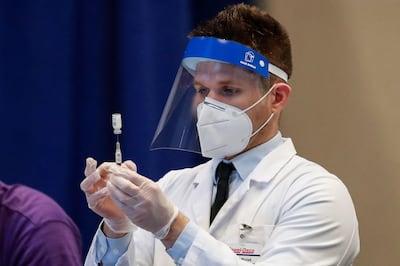European nations were scrambling to keep their Covid-19 vaccine campaigns on track on Wednesday after Johnson & Johnson unilaterally halted exports of its single-dose shot to the bloc.
US drug regulators recommended pausing its use due to reports that the drug could be responsible for rare blood clots in women under 50.
The suspension of shipments, described by an EU official as unexpected, was another major blow for Europe's sluggish vaccine programme.
Use of the drug in the EU only started on Monday after approval by the European Medicines Agency last month.
Despite the setback, Belgium said it would not stop distribution, while the Dutch drug regulator said benefits of the Johnson & Johnson vaccine outweighed possible risks and Spain said it was not aware of any lag.
However, delayed distribution is likely to hamper vaccination plans in Ireland, which faces a shortfall of up to 600,000 doses that were due by June, its national media reported.
The country's health minister on Wednesday said authorities were now considering extending the gap between inoculations of the Pfizer-BioNTech vaccine to help cope with the shortage.
"We are looking [at] options for how we can keep the pace of the vaccine programme going, given the news we've had,” Stephen Donnelly said.
"Certainly, extending the interval for Pfizer beyond the four weeks is something that is being looked at.”
The EU hopes to administer 360 million doses by the end of June, which would see around 70 per cent of the bloc’s population protected.
On Wednesday, it was reported that Denmark would permanently cease to administer the Oxford-AstraZeneca vaccine. The move will delay Denmark's vaccination campaign by a few weeks, broadcaster TV 2 said.
In Germany, people aged under 60 who have been given a first dose of the Oxford-AstraZeneca coronavirus vaccine will receive a different jab for their second dose, federal and regional health ministers agreed Tuesday.
The EMA said it was assessing blood-clotting cases linked to Johnson & Johnson’s vaccine that emerged in the US, although the agency reiterated that no causal link was yet established.
One EU official told Reuters that the suspension of shipments was surprising because the US drug maker had last week agreed to deliver 55 million doses to the EU, as contracted, by the end of June. At that time, suspicious blood clots were already under investigation.
EU Health Commissioner Stella Kyriakides said the EMA was monitoring the safety of the vaccine.
Johnson & Johnson did not reply to questions on whether the delay would affect EU delivery targets.
US authorities said the review would take only a few days, but the delay fed into broader concerns in the EU about vaccine supplies.
"This is worrying news – sounds like it may end up the same way as AstraZeneca," an EU diplomat said, referring to the Anglo-Swedish company, which announced delays just before the start of its EU distribution in February.
AstraZeneca has cut supplies to the bloc to 100 million doses by the end of June from the 300 million under its supply contract, causing a dispute with the EU that remains unresolved.
In March, Reuters reported that Johnson & Johnson informed EU officials of potential difficulties in meeting delivery targets for the second quarter. The company delayed distribution in Europe from the initially planned April 1.
Meanwhile, the European Commission decided not to renew contracts next year with AstraZeneca and Johnson & Johnson, Italian newspaper La Stampa reported on Wednesday, citing a source from Italy's health ministry.
"The European Commission, in agreement with the leaders of many EU countries, has decided that the contracts with the companies that produce viral vector vaccines that are valid for the current year will not be renewed at their expiry," the newspaper said.
Brussels would rather focus on Covid-19 vaccines using messenger RNA technology, such as Pfizer's and Moderna's, it said.
A commission spokesman said it was keeping all options open to be prepared for the next stages of the pandemic, for 2022 and beyond.
"We cannot, however, comment on contractual issues," he said.
EU countries will receive 50 million more coronavirus vaccines produced by Pfizer and BioNTech in the second quarter, European Commission President Ursula von der Leyen said.
Ms von der Leyen said the deliveries, which will start this month instead of in October, will take total supplies to the EU from Pfizer to 250 million doses in the second quarter in a move meant to compensate for lower supplies from AstraZeneca and possible problems with Johnson & Johnson.
"I am pleased to announce that we have reached an agreement with BioNTech-Pfizer to once again speed up the delivery of vaccines," she said.
"This will substantially help consolidate the roll-out of our vaccination campaigns."
In a tweet, she also revealed that 100 million vaccinations had been administered in the EU.













